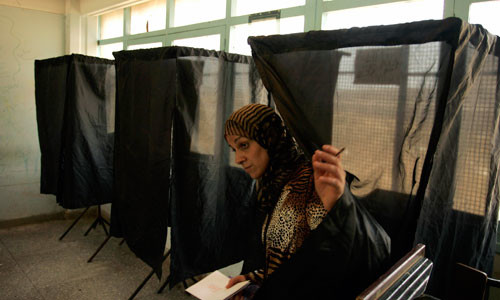Morocco Country Page
In Morocco, IFES continues the mission of the Status of Women in the Middle East and North Africa (SWMENA) project by focusing on gender gaps and working with local partners.
IFES is working with its in-country advisor L’Union de l’Action Feminine (UAF) to continue to disseminate data on the status of women. IFES has issued a subgrant to a local NGO, L’Association El Amane pour la Développement de la Femme, so it can work with five other partner organizations in Morocco to train women on political and civic participation in the run-up to the November 2011 parliamentary elections.
What We Are Doing
- Issuing a subgrant to El Amane and working with UAF to help realize El Amane’s goals
- In November 2011, IFES will hold the final regional lessons learned workshop in Marrakech, Morocco that will bring together SWMENA advisors and partners from across the region in a final discussion on the SWMENA impact.
- Finalizing the Morocco country report for publication
Our Impact
- In September 2011, IFES held the local lessons learned workshop in Casablanca, Morocco to discuss the IFES and SWMENA impact and solicit suggestions for improvement on future activities.
- IFES released a Request for Proposals in February 2011 for organizations to submit proposals using SWMENA data for their advocacy. El Amane was selected to receive a subaward.
- On February 11-12 2011, IFES hosted a Finance and Proposal Writing and Monitoring and Evaluation training in Casablanca, Morocco for women’s organizations. The workshop covered basic topics on proposal writing, financial management and key M&E concepts and principles to enhance participant’s success in managing projects.
- IFES conducted a capacity building workshop on advocacy skills and techniques during November 2010 for members of NGOs. During the workshop, IFES’ advocacy specialist led an interactive workshop focused on topics such as advocacy techniques and delivery of testimony to parliament. This was largely based on IFES’ Lobby Training Manual, available in English and Arabic.
- In November 2010, IFES met with Moroccan parliamentarians to provide them with the SWMENA results and to hear their recommendations about how women’s advocates can improve communication with members of parliament so that they can advocate on women’s issues in the government. This workshop also resulted in the re-activation of the Moroccan Women Parliament's Forum.
- Bringing together NGO representatives, parliamentarians, and government officials, IFES and IWPR conducted a data dissemination workshop in June 2010 to release the initial Morocco survey findings and eliciting feedback and analysis on the results from local stakeholders. IFES presented participants with an overview of the survey and respondent demographics and covered the results of six of the major topics included in the questionnaire. The results are summarized in topic briefs, available in English and French.
- Throughout December 2009 and January 2010, IFES’ Research Specialist worked in partnership with a local survey firm, LMS-CSA, to implement the SWMENA Morocco survey through in person interview of 2,500 Moroccan men and women aged 18 years and older.
- In May 2009, IFES conducted an NGO workshop in Morocco to collect information from local NGOs and academics on important data gaps needed by women’s advocates for their work in Morocco. From this information, the questions for the country specific surveys were derived.
- In May 2009, IFES, IWPR and advisors from Lebanon, Morocco and Yemen convened in Beirut for a regional Indicator Working Group Meeting. During this meeting, IFES and IWPR worked with the local advisors to create the basis for the comparative portion of the SWMENA surveys.
Topic Briefs
Morocco
- Project Overview & Respondent Demographics
- Civic and Political Participation Topic Brief
- Educational Attainment and Career Aspirations Topic Brief
- Paid Work and Control of Earnings & Assets Topic Brief
- Social Attitudes Toward Women Topic Brief
- Opinions on the Family Law and Gender Quotas Topic Brief
- Freedom of Movement, & Freedom from Harassment & Violence Topic Brief
- Health Care Access Topic Brief
Topics



